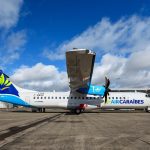The Federal Government of Brazil, through the Ministry of Ports and Airports (MPor), is conducting a roadshow this Tuesday and Wednesday, November 26 and 27, to present the AmpliAR program to airport concessionaires operating in the country. This initiative aims to attract private investments to the regional airport network and connect remote areas with the country’s main air hubs.
The model will allow concessionaires to take over the management of regional airports through a simplified competitive process. They will be able to include the airports in their concession contracts in exchange for specific contractual rebalances, such as reduced concession payments or extended contract terms.
The main objective is to modernize and optimize airport infrastructure in these areas, integrating them into the national air network and promoting the country’s socioeconomic development, according to our associated media outlet in Brazil, AEROIN.
In its first phase, the program will focus on 51 airfields located in the Legal Amazon and the Northeast, regions with significant airport infrastructure deficits. This includes two airports in Acre, 15 in Amazonas, one in Amapá, 11 in Pará, four in Rondônia, and one in Tocantins.
The selection of airports was based on the National Aeronautical Plan (PAN), a document that evaluates the social cost-benefit of the investments to be made.
The Minister of Ports and Airports, Silvio Costa Filho, emphasized that this is a historic demand, with decades of waiting for an effective solution. “Regional airports are essential for Brazil’s connectivity, especially in regions like the North, where there are few other transportation options,” he stated.
Costa Filho also highlighted that the AmpliAR model is unique, seeking to incorporate blocks of deficit airports into existing concession contracts, provided that concessionaires invest in the modernization and management of terminals until the end of the contract. In exchange, concessionaires will have their contracts rebalanced.
“We are creating a solid path to ensure a lasting solution for strategic regional airports. The model attracts investors with the opportunity to enhance their current contracts while helping connect the country more efficiently,” concluded Costa Filho.
Outlook
The PAN identifies more than 200 strategic airports across Brazil. However, only around 50 handle more than 300,000 passengers annually, highlighting the predominance of regional airports. According to the National Secretary of Civil Aviation, Tomé Franca, the AmpliAR program could generate more than 5 billion reais (~USD 900 million) in private investments, directly benefiting nearly a hundred regional airports.
“This is an innovative model, specifically designed for Brazil’s characteristics, which is the second country in the world with the highest number of airports with regular flights,” Franca commented.
He further explained that, with this new program, states and municipalities will have the opportunity to access the benefits of the federal concession program to develop airports of regional interest. Concessionaires will be able to compete for airport blocks through a simplified bidding process, being compensated through the rebalancing of their main contracts.
Next steps
In the coming days, a public consultation will be opened to collect input from states, municipalities, concessionaires, Infraero, airlines, and other sector entities, aiming to ensure the model is as efficient and beneficial as possible for the population.
The Government plans to hold the auction of airport blocks in the first half of 2025.
According to the Ministry of Ports and Airports, this initiative promises to transform regional aviation in Brazil, improving connectivity, infrastructure, and the quality of services offered.














